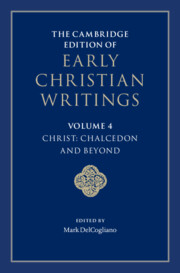Book contents
- The Cambridge Edition of Early Christian Writings
- The Cambridge Edition of Early Christian Writings
- The Cambridge Edition of Early Christian Writings
- Copyright page
- Contents
- Notes on Contributors
- Acknowledgments
- Note on the Texts and Translations
- Abbreviations
- Series Introduction
- Introduction
- Part I The Council of Chalcedon and Its Reception
- Part II Christological Perspectives after Constantinople II
- 20 Emperor Justin II, The Second Henotikon
- 21 Gregory the Great, Selections from his Homilies
- 22 Gregory the Great, Letters 1.24, 10.21, and 11.52
- 23 Anonymous Apology for Narsai
- 24 Babai the Great, On the Union 9 and 17
- 25 Sophronius of Jerusalem, Synodical Letter 1.6 and 3.1–17
- 26 Ekthesis of Emperor Heraclius
- 27 Maximus the Confessor, Ambiguum 31 to John
- 28 Maximus the Confessor, Ambiguum 5 to Thomas
- 29 Maximus the Confessor, Opusculum 3
- 30 Maximus the Confessor, Opusculum 6
- 31 Maximus the Confessor, Opusculum 7
- 32 Typos of 647/8
- 33 Acts of the Lateran Synod (October 649): Selected Proceedings and the Synodal Definition
- 34 Acts of the Third Council of Constantinople (680–681): Selected Proceedings and the Synodal Definition
- 35 John of Damascus, On Composite Nature against the Leaderless
- 36 John of Damascus, On the Faith against the Nestorians
- 37 John of Damascus, An Exact Exposition of the Orthodox Faith 57–58
- Suggestions for Further Reading
- Scriptural Index
30 - Maximus the Confessor, Opusculum 6
from Part II - Christological Perspectives after Constantinople II
Published online by Cambridge University Press: 11 February 2022
- The Cambridge Edition of Early Christian Writings
- The Cambridge Edition of Early Christian Writings
- The Cambridge Edition of Early Christian Writings
- Copyright page
- Contents
- Notes on Contributors
- Acknowledgments
- Note on the Texts and Translations
- Abbreviations
- Series Introduction
- Introduction
- Part I The Council of Chalcedon and Its Reception
- Part II Christological Perspectives after Constantinople II
- 20 Emperor Justin II, The Second Henotikon
- 21 Gregory the Great, Selections from his Homilies
- 22 Gregory the Great, Letters 1.24, 10.21, and 11.52
- 23 Anonymous Apology for Narsai
- 24 Babai the Great, On the Union 9 and 17
- 25 Sophronius of Jerusalem, Synodical Letter 1.6 and 3.1–17
- 26 Ekthesis of Emperor Heraclius
- 27 Maximus the Confessor, Ambiguum 31 to John
- 28 Maximus the Confessor, Ambiguum 5 to Thomas
- 29 Maximus the Confessor, Opusculum 3
- 30 Maximus the Confessor, Opusculum 6
- 31 Maximus the Confessor, Opusculum 7
- 32 Typos of 647/8
- 33 Acts of the Lateran Synod (October 649): Selected Proceedings and the Synodal Definition
- 34 Acts of the Third Council of Constantinople (680–681): Selected Proceedings and the Synodal Definition
- 35 John of Damascus, On Composite Nature against the Leaderless
- 36 John of Damascus, On the Faith against the Nestorians
- 37 John of Damascus, An Exact Exposition of the Orthodox Faith 57–58
- Suggestions for Further Reading
- Scriptural Index
Summary
Opusculum 6 is another work of Maximus that stems from his involvement in the monoenergist and monothelite controversies discussed in the introduction to Ambiguum 31 to Thomas. Opusculum 6, “Concerning the statement, ‘Father, if possible, let this cup pass from me,’” dates to 640 or 641. By that time Maximus was thoroughly embroiled in combating monothelitism. This position – which maintained that Christ had only one will (thelēma) – grew out of the somewhat vaguer and perhaps more conciliatory monoenergist position. When Heraclius promulgated the Ekthesis in 638, the deliberately nebulous language of the Psēphos gave way to a more definitive statement of the singularity of Christ’s activity and will. Maximus had already objected to monoenergism, and now all the more strongly to monothelitism. He argued that the distinction of human and divine wills in Christ did not imply their opposition, and this claim is most tested in Jesus’s prayer in Gethsemane (Matthew 26:39–40).
- Type
- Chapter
- Information
- The Cambridge Edition of Early Christian Writings , pp. 500 - 503Publisher: Cambridge University PressPrint publication year: 2022

